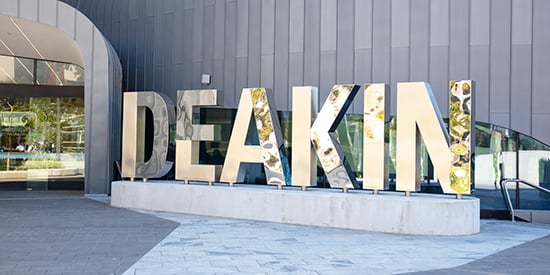#1 in Australia for education and educational research*
#5 in the world for education and educational research*
Gain the professional requirements to teach in IB PYP schools
Key facts
Duration
1 year part-time
Locations
Key dates
Direct applications to Deakin for Trimester 2 2024 close 23 June 2024
Current Deakin Students
To access your official course details for the year you started your degree, please visit the handbook
Course overview
The Graduate Certificate of Education (International Baccalaureate PYP Early Years) is aimed at providing current early childhood and/or Primary teachers with the specialist skills, knowledge and theoretical understanding of the IB PYP, with a specific focus on the early years (children 3-8 years). Graduates of this course will be able to apply for recognition by the IBO as having met the expected professional learning requirements to teach in an IB PYP school.
The Course consists of units which covers Inquiry Learning Through the International Baccalaureate (PYP), which introduces students to the IB PYP from a theoretical and practice-based understanding:
- The Inquiring Child: The Role of Play in Children's Learning, explores the connections between contemporary, research-based thinking on theories of play and inquiry practice in the early years and the IB PYP, and teachers’ own pedagogical approaches and experiences;
- Assessing and Documenting Learning in the Global Early Years Context, analyses the role of assessment in contexts of play, relationships, environment and symbolic learning in early years education drawing in global perspectives and contemporary perspectives; and
- Planning for Inquiry Learning: Professional Practice and Portfolio is a praxis unit which provides students with the opportunity to connect the theoretical understanding of the IB PYP pedagogy and approaches with practical opportunities to enact planning, teaching and assessment in an IN PYP (Early Years) setting.
Through undertaking 15-days fieldwork in an IB PYP (Early Years) students will work in collaboration with experienced IB PYP (Early Years) teachers to plan, teach and assess a unit of inquiry.
Read MoreCourse information
- Award granted
Graduate Certificate of Education (International Baccalaureate PYP Early Years)
- Year
2024 course information
- Deakin code
- E511
- Level
- Postgraduate (Graduate Certificate and Graduate Diploma)
- Australian Qualifications Framework (AQF) recognition
The award conferred upon completion is recognised in the Australian Qualifications Framework at Level 8
Course structure
To complete the Graduate Certificate of Education (International Baccalaureate PYP Early Years), students must attain 4 credit points.
The course comprises a total of 4 credit points including:
- 4 credit points of core units (EIB701, EIB702, EIB703, EIB704)
- DAI001 Academic Integrity Module (0-credit-point compulsory unit)
Students are required to meet the University's academic progress and conduct requirements.
Intakes by location
The availability of a course varies across locations and intakes. This means that a course offered in Trimester 1 may not be offered in the same location for Trimester 2 or 3. Check each intake for up-to-date information on when and where you can commence your studies.
Trimester 1 (part-time only) - March
- Start date: March
- Available at:
- Online
Trimester 2 (part-time only) - July
- Start date: July
- Available at:
- Online
Additional course information
Course duration
Course duration may be affected by delays in completing course requirements, such as accessing or completing work placements.
Mandatory student checks
Any unit which contains work integrated learning, a community placement or interaction with the community may require a police check, Working with Children Check or other check.
Workload
Students will on average spend 150-hours over the teaching period for each credit point undertaking required teaching, learning and assessment activities.
Participation requirements
Reasonable adjustments to participation and other course requirements will be made for students with a disability. More information available at Disability support services.
Entry requirements
Selection is based on a holistic consideration of your academic merit, work experience, likelihood of success, availability of places, participation requirements, regulatory requirements, and individual circumstances. You will need to meet the minimum academic and English language proficiency requirements to be considered for selection, but this does not guarantee admission.
Academic requirements
To be considered for admission to this degree you will need to meet the following criteria:
- completion of a bachelor degree or higher in either early childhood education or primary education
English language proficiency requirements
To meet the English language proficiency requirements of this course, you will need to demonstrate at least one of the following:
- IELTS (Academic): minimum overall band of 7.0 (with no individual band less than 7.0) speaking and listening 7.5
- TOEFL iBT: minimum overall score of 102 (with minimum score of 24 in reading and speaking, 27 in listening and writing)
- PTE Academic: minimum score of 65 (with no communication band less than 65) speaking and listening 73
English-speaking education:
- completion of a bachelor degree in a recognised English-speaking country with a WAM of at least 60 or completion of DUELI English for Teaching program
- professional recognition: completion of a bachelor degree or higher in the field of education that is a recognised initial teacher qualification for the purpose of registration as an early childhood or primary teacher in Australia
Admissions information
Learn more about Deakin courses and how we compare to other universities when it comes to the quality of our teaching and learning.
Not sure if you can get into Deakin postgraduate study? Postgraduate study doesn’t have to be a balancing act; we provide flexible course entry and exit options based on your desired career outcomes and the time you are able to commit to your study.
Recognition of prior learning
The University aims to provide students with as much credit as possible for approved prior study or informal learning which exceeds the normal entrance requirements for the course and is within the constraints of the course regulations. Students are required to complete a minimum of one-third of the course at Deakin University, or four credit points, whichever is the greater. In the case of certificates, including graduate certificates, a minimum of two credit points within the course must be completed at Deakin.
You can also refer to the Recognition of prior learning system which outlines the credit that may be granted towards a Deakin University degree and how to apply for credit.
Recognition of prior learning may be granted to applicants based on prior studies and/or equivalent industry experience.
Fees and scholarships
Fee information
Learn more about fees and your options for paying.
The available fee places for this course are detailed above. Not all courses at Deakin have Commonwealth supported places available.
The 'Estimated tuition fee' is provided as a guide only based on a typical enrolment of students completing this course within the same year as they started. The cost will vary depending on the units you choose, your study load, the length of your course and any approved Recognition of prior learning.
One year full-time study load is typically represented by four credit points of study for Graduate Certificates. Each unit you enrol in has a credit point value. The 'Estimated tuition fee' is calculated by adding together four credit points of a typical combination of units for your course. You can find the credit point value of each unit under the Unit Description by searching for the unit in the Handbook. Learn more about fees and available payment options on our Current students fees website.
FEE-HELP calculator
What is FEE-HELP?
FEE-HELP loans cover up to 100% of tuition fees for eligible students. By taking out a FEE-HELP loan, the government pays your tuition fees directly to Deakin, and the balance is repaid from your employment income - but only once you're earning over $51,550.
Please note: fees shown by the calculator are indicative only and based on 2024 rates. Actual fees may vary. We advise confirming fees with Prospective Student Enquiries prior to enrolment.
Estimate your FEE-HELP
FEE-HELP payments
per pay cycle
Take-home pay
after FEE-HELP and tax
per pay cycle
Your estimated FEE-HELP repayments
- $* is the estimated full cost for a Graduate Certificate of Education (International Baccalaureate PYP Early Years) (4 credit points), based on the 2024 fees.
- is the annual FEE-HELP payment, based on your current salary
- of your current salary be spent on FEE-HELP
*Disclaimer
Deakin University (Deakin):
- gives no warranty and accepts no responsibility for the currency, accuracy or the completeness of the information provided;
- advises users that no reliance should be placed upon on the information provided, and;
- instructs users that they should confirm the actual course fee with Prospective Student Enquiries prior to enrolment.
This tool provides indicative information about the fees that will be payable in respect of courses and subjects offered to prospective students domiciled in Australia during the periods indicated.
Please note that the fees shown by the calculator are indicative only and actual fees may vary. Users are advised to confirm the actual course fee with Prospective Student Enquiries prior to enrolment.
The estimated course fee is based on the tuition fee costs applicable to a domestic full time student commencing the course in Trimester 1 and studying full time for the duration of the course but:
- does not include non-tuition costs that may apply, such as Student Services and Amenities Fees (SSAF);
- does not take into account any scholarships or bursaries awarded to the student (including the 10% Deakin alumni discount);
- assumes the maximum number of units that need to be successfully completed actual number completed may be reduced if recognition of prior learning is granted;
- assumes that no exceptional, or non-typical, circumstances apply to the proposed course of study;
- assumes that the options that the user selects are appropriate for the course of study that they intend to undertake;
- where fees are estimated for future years those fee will be subject to annual increases in accordance with increases in the cost of course delivery.
Scholarship options
A Deakin scholarship might change your life. If you've got something special to offer Deakin – or you just need the financial help to get you here – we may have a scholarship opportunity for you.
Postgraduate bursary
If you’re a Deakin alumnus commencing a postgraduate award course, you may be eligible to receive a 10% reduction per unit on your enrolment fees.
Apply now
Some of our courses have limited places available - for the latest on courses still open for application, visit Courses by trimester.
Create an account in the Deakin Application Portal, start your application, enter personal details, education experience, upload supporting documents and submit. Need help? Play this video, or contact one of our friendly future student advisers on 1800 693 888 or submit an online enquiry.
For more information on the application process and closing dates, see the How to apply webpage. If you're still having problems, please contact us for assistance.
Entry pathways
Guaranteed entry pathways:
Deakin University: Bachelor of Education (Primary), Bachelor of Early Childhood and Primary Education, Bachelor of Early Childhood Education, Bachelor of Education (Early Childhood), Master of Teaching (Primary), Master of Teaching (Primary and Early Childhood), Master of Teaching (Early Childhood).
RPL will be assessed on an individual basis only, within the limits prescribed by the Recognition of prior learning Policy, and where an applicant can ‘demonstrate that they have achieved learning outcomes equivalent to the learning outcomes of that component’. It is not expected that RPL could be granted in most situations
Contact information
Our friendly advisers are available to speak to you one-on-one about your study options, support services and how we can help you further your career.
- Call us: 1800 693 888 Mon–Fri, 9am–5pm
- Live Chat: Mon–Thurs, 8am–7pm, Fri 8am–5pm
- Submit an online enquiry
- Help hub find common and trending questions and answers
Careers
Career outcomes
The Graduate Certificate of Education (International Baccalaureate PYP Early Years) will provide graduates with the required skills, knowledge and underpinning theory of the IB PYP Program and the IBO will recognise graduates as meeting the professional requirements to teach in an IB YP school. The IB PYP is a globally recognised curriculum and accredited IB PYP schools can be found both in Australia and across many countries in North America, Europe and Asia. Additionally, there is an increasing number of schools across Asia applying to become IBO accredited schools, resulting in the need for increasing opportunities for suitably qualified teachers to address the employment needs. As a professional post graduate qualification, the Graduate Certificate of Education (International Baccalaureate PYP Early Years) provides an opportunity for current early childhood and primary school teachers to build on their existing qualifications to gain this additional specialisation which will result in further employment opportunities for graduates both in Australia and internationally, as well as attract students internationally who need to undertake the professional learning necessary to be employed in an IB PYP school. Furthermore, the course design as a Graduate Certificate can also lead to a Master of Education, providing additional opportunities for current teachers seeking to build their professional skills and understanding.
Course learning outcomes
Deakin's graduate learning outcomes describe the knowledge and capabilities graduates can demonstrate at the completion of their course. These outcomes mean that regardless of the Deakin course you undertake, you can rest assured your degree will teach you the skills and professional attributes that employers value. They'll set you up to learn and work effectively in the future.
| Deakin Graduate Learning Outcomes | Course Learning Outcomes |
| Discipline-specific knowledge and capabilities | Contribute to critical, professional debates about education theory in a global context as it applies to early years curriculum and pedagogy and ethical codes and standards, and these understandings to inform their own practice as a global early educator. |
| Communication | Apply critical thinking, pedagogical and effective interpersonal, oral, written and multimodal communication skills to demonstrate empathy, foster learner agency, establish positive and inclusive internationally minded learning environments, and build effective professional collaborative partnerships and trust with teaching colleagues, families and other stakeholders |
| Digital literacy | Act in accordance with the ethical and legal frameworks and policy that inform responsible and ethical practice in digital environments, and critically discuss, evaluate and employ a range of appropriate digital literacies, resources and technologies for professional/community/learner engagement and agency. |
| Critical thinking | Engage with contemporary critical and professional debates regarding global education trends, theory, policy and research and use these understandings to critically reflect on and evaluate own teaching practices and diverse learning data sets to make informed evidence-based judgements for enhancements and innovations to improve learner agency and outcomes. |
| Problem solving | Collaboratively and independently use evidence and research to identify, prioritise and creatively respond to problems that arise in professional learning and practice. |
| Teamwork | Actively and collaboratively participate in, and/or lead learning communities, involving learners, families, community members, colleagues and the broader profession to deepen understandings of global education and international mindedness to optimise learning and learner outcomes |
| Global citizenship | Engage in research and professional collaborations to develop informed positions on and approaches to internationally minded educational transformation as applied to learner agency and global citizenship; Indigenous and intercultural issues; global education trends and issues; and, social justice and sustainability. |
| Approved by Faculty Board October 2021 | |
Events Explore more events
Footnotes
* U.S. News & World Report, Best Global Universities Subject Rankings 2022–2023




